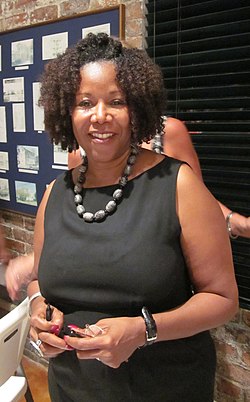Ruby Bridges
Ruby Nell Bridges Hall (born September 8, 1954) is an American activist. She is known for being the first black child to attend an all-white elementary school in the South. She went to William Frantz Elementary School, in Louisiana, USA.
Early life
Ruby Bridges was born in Tylertown, Mississippi to Abon and Lucille Bridges.[1] When she was 4 years old, the family moved to New Orleans, Louisiana. In 1960, when she was 6 years old, her parents allowed her to participate in the integration of the New Orleans School system.
Integration
In a 1954 decision, Brown v. Board of Education, the U.S. Supreme Court made racial segregation illegal.[2] Ruby was chosen to attend the all-white William Frantz Elementary School.[3] The school board said black children could attend the first grade if they passed a test.[4] Bridges passed a test. On her first day of school four U.S. Marshals had to go with her to school. She went straight to the principal's office.[5]She sat in the principal's office all day. Angry crowds of parents shouted threats at her. For the next six months the marshals took her to and from her school.[3] Ruby had to spend the entire first school year alone with one teacher, Barbara Henry.[5] People tried to hurt her family. Her father lost his job and her grandparents were thrown off their farm in Georgia.[6] Ruby never missed a day of school that year.[6] The story of her going to a white school is the subject of a Norman Rockwell painting called The Problem We All Live With.[7]
Adult life
She finished elementary school and graduated from high school. Bridges went on to become a travel agent for American Express.[8] Mrs. Ruby Bridges got married to Malcolm Hall and had four sons.[8] In 1993, her brother was shot and killed in New Orleans. Ruby's family went to New Orleans to take care of his daughters.[9]
In 1999, she wrote a children's book, "Through My Eyes", telling her story and what she went through.[8] The same year she started the Ruby Bridges Foundation. She travels and talks to children all over the country.[8]
On 8 January 2001, President Bill Clinton awarded Ruby Bridges the Presidential Citizens Medal.[10] She was one of 28 to receive the medal that day.
Ruby Bridges Media
References
- ↑ Madeline Donaldson, Ruby Bridges (Minneapolis, MN: Lerner Publications, 2009), p. 7
- ↑ "U.S. Supreme Court, BROWN v. BOARD OF EDUCATION, 347 U.S. 483 (1954)". FindLaw. Thomson Reuters. 2014. Retrieved 12 June 2014.
- ↑ 3.0 3.1 Leslie Kaplan; William Owings, Educational Foundations (Australia: Wadsworth, 2014), p. 153
- ↑ Madeline Donaldson, Ruby Bridges (Minneapolis, MN: Lerner Publications, 2009), p. 14
- ↑ 5.0 5.1 Dewey, Joseph (2018). "Ruby Bridges". Salem Press Biographical Encyclopedia.
- ↑ 6.0 6.1 Lottie L. Joiner (Nov 19, 2010). "50 years after childhood stand, Ruby Bridges still works for change". shreveport Times (www.shreveporttimes.com). Archived from the original on 3 July 2014. Retrieved 12 June 2014.
- ↑ CBSNEWS.COM STAFF (February 22, 2001). "Ruby's Bridge From Child To Adult". CBS Interactive Inc. Retrieved 12 June 2014.
- ↑ 8.0 8.1 8.2 8.3 Chris Rose, The Times-Picayune (January 18, 2009). "Ruby Bridges, an icon of New Orleans integration, will witness another milestone 50 years later". NOLA Media Group. Retrieved 12 June 2014.
- ↑ Dewey, Joseph (2018). "Ruby Brideges". Salem Press Biographical Encyclopedia.
- ↑ "President Clinton Awards the Presidential Citizens Medals". The White House. 8 January 2001. Archived from the original on 31 August 2012. Retrieved 12 June 2014.
Other websites
| Wikimedia Commons has media related to Lua error in Module:Commons_link at line 62: attempt to index field 'wikibase' (a nil value).. |
- The Ruby Bridges Foundation Archived 2013-05-25 at the Wayback Machine
- Ruby Bridges, Webpage


